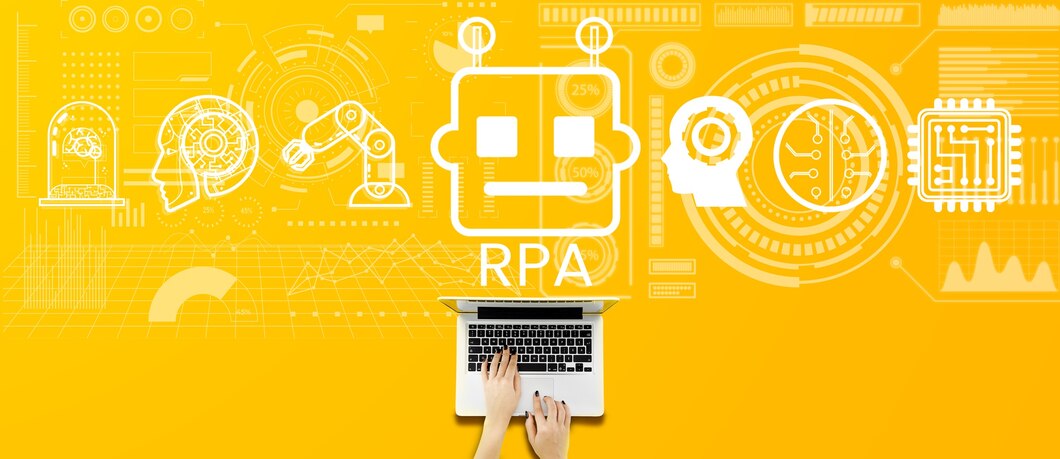In today’s fast-paced business landscape, organizations are constantly seeking innovative solutions to enhance efficiency and productivity. One such solution gaining significant traction is Robotic Process Automation (RPA).
But what exactly is RPA, and how can it revolutionize various industries? Read on!!

What is Robotic Process Automation
Robotic Process Automation, often referred to as RPA, is a technology that automates repetitive and rule-based tasks by mimicking human actions. It utilizes software robots or “bots” to perform repetitive tasks, such as data entry, invoice processing, and customer service inquiries across multiple applications, just like humans do.
Importance of Robotic Process Automation (RPA) in Modern Industries
RPA offers numerous benefits to organizations, including increased efficiency, cost savings, and improved accuracy. Its ability to streamline business processes makes it a valuable asset in today’s competitive environment.
How Does Robotic Process Automation (RPA) Works
RPA bots interact with existing applications through a user interface, performing tasks as instructed by predefined rules. They can navigate through different systems, extract data, and input information with precision.
Key Components of Robotic Process Automation
The key components of RPA include:
- Bot Creator
- Bot Runner
- Control Center
The bot creator, which designs and configures bots, the bot runner, which executes automated tasks, and the control center, which manages and monitors bot activities.
Applications of Robotic Process Automation (RPA)
The applications of Robotic Process Automation (RPA) are diverse and span across various industries and business functions. Some common applications of RPA include:
Robotic Process Automation in Banking
In the banking sector, Robotic Process Automation (RPA) is used for automating account opening processes, transaction monitoring, and compliance reporting, resulting in faster turnaround times and improved regulatory compliance.
Robotic Process Automation in Finance
Finance departments leverage RPA for automating tasks such as reconciliations, invoice processing, and financial reporting, enabling them to streamline operations and reduce manual errors.
Robotic Process Automation in Healthcare
In healthcare, RPA is employed for tasks like patient registration, claims processing, and appointment scheduling, enhancing operational efficiency and patient care delivery.
Robotic Process Automation in Human Resources
HR departments utilize RPA for automating recruitment processes, employee onboarding, and payroll processing, freeing up time for HR professionals to focus on strategic initiatives.
Robotic Process Automation in Software Testing
RPA tools are utilized in software testing to automate regression testing, data validation, and performance testing, ensuring the quality and reliability of software applications.
Robotic Process Automation in Accounting
In accounting, RPA is used for automating tasks such as journal entries, accounts payable/receivable processing, and financial statement generation, enabling finance teams to improve accuracy and efficiency.
Robotic Process Automation in Insurance
Robotic Process Automation (RPA) is reshaping the insurance industry by automating repetitive tasks and streamlining operations. In insurance, RPA is utilized for various purposes such as claims processing, policy administration, underwriting support, customer service, and fraud detection.
Benefits of Implementing Robotic Process Automation (RPA)
Implementing Robotic Process Automation (RPA) offers a multitude of benefits to organizations across various industries. Some of the key benefits include:
Increased Efficiency and Accuracy
RPA streamlines processes, reduces errors, and accelerates task completion, leading to enhanced efficiency and accuracy in business operations.
Cost Savings
By automating repetitive tasks, RPA helps organizations save time and resources, leading to significant cost savings in the long run.
Enhanced Employee Productivity
RPA frees up employees from mundane tasks, allowing them to focus on more strategic and value-added activities, thereby increasing overall productivity.
Improved Customer Experience
With RPA, organizations can deliver faster and more accurate services to customers, leading to improved satisfaction and loyalty.
Examples and Use Cases of Robotic Process Automation (RPA)
Robotic Process Automation (RPA) is applied across various industries and business functions to automate repetitive tasks and streamline operations. Here are some examples and use cases of RPA:
Automating Repetitive Tasks
RPA can automate tasks such as data entry, report generation, and email notifications, saving time and reducing manual effort.
Data Entry and Processing
RPA bots can extract data from various sources, validate it, and input it into relevant systems, eliminating errors and speeding up processes.
Customer Service Automation
RPA enables organizations to automate responses to common customer inquiries, providing faster resolution and improving customer satisfaction.
Report Generation
RPA tools can generate reports on-demand by extracting data from multiple sources, formatting it, and presenting it in the desired format.
Robotic Process Automation Tools and Software
Robotic Process Automation (RPA) tools and software are essential components for implementing automation solutions in organizations.
These tools enable businesses to create, deploy, and manage software robots (bots) that automate repetitive and rule-based tasks. Here are some commonly used RPA tools and software:
SAP Robotic Process Automation
SAP offers RPA solutions that integrate seamlessly with its existing software suite, enabling organizations to automate business processes end-to-end.
UiPath Robotic Process Automation
UiPath is a leading RPA platform that offers a range of tools and features for automating tasks across various industries and business functions.
Automation Anywhere in Robotic Process Automation
Automation Anywhere provides RPA solutions that empower organizations to automate repetitive tasks and streamline business operations.
Blue Prism Robotic Process Automation
Blue Prism offers an enterprise-grade RPA platform that enables organizations to deploy, manage, and scale automation initiatives effectively.
Future Trends and Growth of Robotic Process Automation (RPA)
The future of Robotic Process Automation (RPA) appears promising, with several trends and growth opportunities on the horizon. Here’s a glimpse into what we can expect:
Expanded Adoption Across Industries
As businesses continue to recognize the benefits of RPA, we can anticipate its adoption spreading across various sectors beyond its current strongholds in finance, healthcare, and manufacturing. Industries such as retail, telecommunications, and logistics are poised to embrace RPA to streamline operations and drive efficiency.
Integration with Emerging Technologies
RPA is evolving beyond its standalone capabilities, with increasing integration with emerging technologies such as Artificial Intelligence (AI) and Machine Learning (ML). This convergence allows for more intelligent automation solutions that can adapt to dynamic environments and learn from data, opening up new possibilities for enhanced efficiency and innovation.
Focus on Governance and Compliance
With the proliferation of RPA deployments, there’s a growing emphasis on governance, risk management, and compliance (GRC) frameworks. Organizations are prioritizing robust governance structures to ensure adherence to regulatory requirements and mitigate potential risks associated with automation.
Rise of Citizen Developers
The democratization of RPA is empowering individuals outside of traditional IT roles to become “citizen developers.” These non-technical users can leverage low-code or no-code platforms to create and deploy automation solutions, democratizing access to automation capabilities across organizations.
Shift Towards Hyperautomation
Hyperautomation, a concept coined by Gartner, refers to the combination of multiple technologies, including RPA, AI, ML, and process mining, to automate complex business processes end-to-end. This holistic approach enables organizations to achieve greater levels of automation and efficiency across their operations.
Focus on Employee Upskilling
As automation reshapes the nature of work, there’s a growing recognition of the importance of employee upskilling and reskilling. Organizations are investing in training programs to equip their workforce with the skills needed to thrive in an automated environment, fostering a culture of continuous learning and adaptation.
Job Opportunities in the Robotic Process Automation Field
The field of Robotic Process Automation (RPA) presents numerous job opportunities for individuals seeking to embark on a career in this burgeoning sector. As businesses across various industries continue to adopt RPA technologies to streamline operations and drive efficiency, the demand for skilled professionals proficient in RPA development, implementation, and maintenance is on the rise.
Job roles in the Robotic Process Automation field span across various domains, including:
Robotic Process Automation Developer
Responsible for designing, developing, and implementing RPA solutions to automate business processes. This role involves coding and configuring RPA bots using specialized software platforms such as UiPath, Automation Anywhere, or Blue Prism.
Robotic Process Automation Analyst
Analyzes business processes to identify automation opportunities and collaborates with stakeholders to design and implement RPA solutions that align with organizational objectives.
Robotic Process Automation Consultant
Provides consulting services to organizations seeking to implement RPA solutions, offering expertise in process optimization, tool selection, and deployment strategy.
Robotic Process Automation Project Manager
Oversees RPA implementation projects, managing timelines, resources, and stakeholder expectations to ensure successful delivery of RPA initiatives.
Robotic Process Automation Quality Assurance (QA) Engineer
Conducts testing and validation of RPA solutions to ensure they meet quality standards and perform as expected in real-world scenarios.
Robotic Process Automation Support Specialist
Provides ongoing support and maintenance for deployed RPA solutions, troubleshooting issues, and implementing enhancements to optimize performance.
Conclusion
Robotic Process Automation (RPA) offers a transformative approach to streamlining business operations and driving efficiency across industries. By automating repetitive tasks and workflows, organizations can achieve significant cost savings, improve accuracy, and enhance employee productivity. As RPA continues to evolve and integrate with emerging technologies, its impact on business processes is poised to grow exponentially, shaping the future of work.
Thank you for discovering this blog to be useful. Feel encouraged to frequent TheGreatInfo.com to remain informed about the most recent technology trends. Wishing you a fantastic day!
Frequently Asked Questions
Q. What are the main benefits of implementing Robotic Process Automation in business?
Robotic Process Automation (RPA) offers benefits such as increased efficiency, cost savings, improved accuracy, and enhanced employee productivity.
Q. How does Robotic Process Automation differ from traditional automation?
Unlike traditional automation, which requires extensive coding and integration, RPA uses software robots to automate tasks through user interfaces, making it faster and more accessible.
Q. Can Robotic Process Automation be applied to any industry?
Yes, RPA can be applied to various industries, including banking, finance, healthcare, human resources, and software testing, among others.
Q. What are some common use cases of Robotic Process Automation in healthcare?
Common use cases of Robotic Process Automation in healthcare include patient registration, claims processing, appointment scheduling, and medical record management.
Q. What is the future outlook for Robotic Process Automation?
The future of Robotic Process Automation (RPA) looks promising, with continued growth across industries and integration with emerging technologies like AI and ML, creating new opportunities for automation and innovation.
Q. What are the best robotic process automation tools?
Robotic Process Automation (RPA) tools are software platforms designed to automate repetitive, rule-based tasks by mimicking human actions.
Here is the list of best robotic process automation tools:
- UiPath
- Automation Anywhere
- Blue Prism
- Microsoft Power Automate
- SAP Intelligent Robotic Process Automation (SAP IRPA)
These RPA tools provide organizations with the flexibility and scalability needed to automate business processes across various industries and functional areas.





